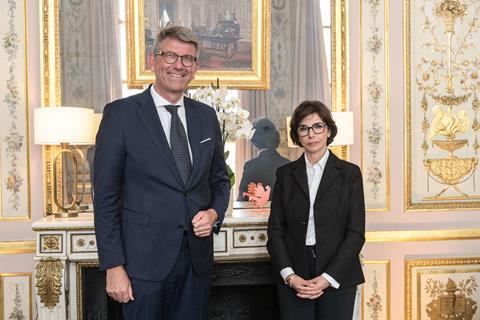
France and Germany aim to work together to transform the Arte TV channel into a major European content platform.
The plan, confirmed by France and Germany’s ministers of culture Rachida Dati and Wolfram Weimer during a meeting in Paris on Wednesday (June 11), is designed to extend the reach of European content and to counter the spread of disinformation.
Dati welcomed a group of European culture ministers to Paris for a working day devoted to bolstering European culture.
The ministers reaffirmed their commitment to enforcing regulations to promote European creation such as the AVMS directive, bolstering copyright laws in the face of the accelerated development of AI, and increasing funding for the arts and entertainment industries via initiatives like the Creative Europe MEDIA programme, the Alliance for Language Technologies (ALT-EDIC) and Digital Europe.
Arte is a publicly funded Franco-German channel known for prestige drama content, including European film productions, and coverage of cultural events. The long-term goal as outlined by the group of ministers is to develop it into a streaming service available in multiple languages to reach wider audiences and offer content ranging from news to films and series.
The ministers said the Arte move comes amidst a spread of disinformation worldwide, combined with the current US administration’s moves to gut government-funded international media. This meant Europe was obligated to “make its voice of freedom heard more loudly in the world,” German culture minister Weimer said at the Paris meeting.
The Parisian meeting of culture ministers also included Arte president Heike Hempel and the president of Arte France Bruno Patino.
It comes after European politicians, decision-makers and producers rallied together during the Cannes Film Festival to underscore the urgent need to support public film funding and regulations that foster independent production, local stories and a diverse industry amidst increased threats to democracy at home and overseas. The driving force has been President Donald Trump’s announcement of plans to impose tariffs on “foreign” films and attacks on the EU’s AVMS directive.
Neither the culture ministers nor Arte have given more details on how the Arte European platform would be funded or which specific languages and territories it would be available.
Addressing media after the meeting, Dati cited “the challenge of transforming Arte into a European reference platform, both in terms of the European languages in which it will be accessible, and the content it will be able to produce and broadcast.” She called the project “a decisive asset in strengthening the European consciousness of our fellow citizens, as well as our democratic resilience, since Arte contributes directly, through the quality of its content, to cultivating critical thinking and everything that can stand in the way of populism and attempts at foreign interference.”

























No comments yet